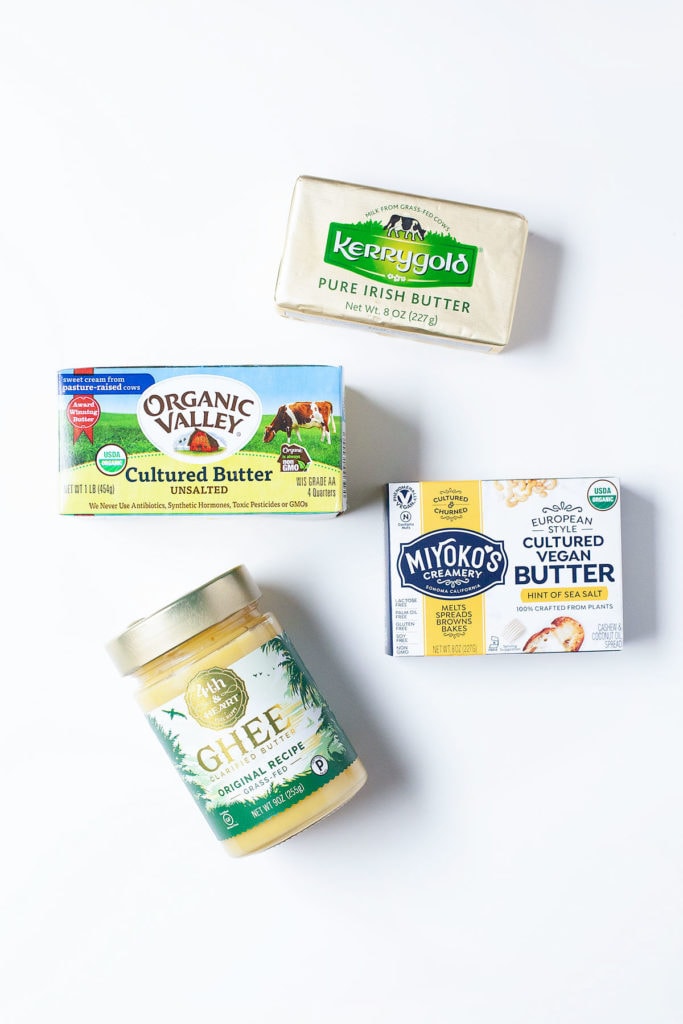The five best healthy fats and oils for cooking: roasting, sautéing, and baking. Read on to about which fats and oils are safe to cook with and which you should never heat!
Healthy Fats for Cooking
You heard the good news, right? Fat doesn’t make you fat.
In fact, fats are required for stable energy, brain function, hormone balance, healthy cell membranes, proper liver function, to absorb fat-soluble vitamins A, D, E, and K, proper inflammation response, and much, much more. Also… fats make food taste good ;). Let’s dig in.
*Interested in the latest research about fat? This book is eye-opening!
Quality Fat
You are what you eat eats. So… butter from a cow that has been fed corn, grain, artificial nutrients, and given antibiotics is a completely different food than butter from cows raised on grass.
Instead of favoring or demonizing any one type of natural fat, I prefer to focus on good, quality sources of that fat. For butter and ghee, that means organic and grass-fed if possible. For oils, that means organic, especially for olive oil because olives are a heavily pesticide sprayed crop.

Fats to Avoid
Instead of demonizing fat or any one type of fat, I like to focus on two things: quality, as mentioned above, and cooking heat. Because all types of natural fats (yes, including butter!) have a time and a place in my book.
That being said, there are a few unnatural fats that it’s best to avoid when possible. These include trans-fats, hydrogenated fats, partially hydrogenated fats, and industrially processed vegetable oils, all of which are inflammatory to the body.
Additionally, there are some fats that are healthy but… become unhealthy when cooked at high temperatures (more on this below).

Three Types of Fat
All fats and oils are some combination of saturated, monounsaturated, and polyunsaturated fatty acids. The lower the percentage of saturated fat, the less ideal it is for cooking since unsaturated fats can oxidize and become rancid quickly when exposed to heat.
Saturated fats, are solid or semi-solid at room temperature and are highly stable and safe for higher heat cooking. Saturated fats are found in high amounts in animal fats, like ghee (60% saturated), and tropical oils, like coconut oil (90% saturated).
Monounsaturated fats are liquid at room temperature and are relatively stable and safe for medium to lower heat cooking. Monounsaturated fats are found in high amounts in oils like olive oil (73% monounsaturated) and avocado oil (73% monounsaturated but good for high heat cooking if naturally refined).
Polyunsaturated fats are usually liquid and are very fragile so they are not safe for cooking. Polyunsaturated fats are found in high amounts in fish, flax, nuts, and seeds. Most fish oils, nut oils, and seed oils should never be heated.

The Five Best Fats and Oils for Everday Cooking
These are the five cooking fats and oils I use regularly in my kitchen, in no particular order:
- Avocado Oil (Naturally Refined)
- Ghee
- Coconut Oil
- Grass-Fed Butter
- Extra Virgin Olive Oil
For high heat cooking (frying, baking, broiling, and roasting), naturally refined avocado oil and ghee are best.
For medium heat cooking (quick stir-frying, light sautéing), butter, coconut oil, and olive oil are good.
Basically, if I’m roasting, I use avocado oil or melted ghee. If I’m sautéing, I use olive oil, coconut oil, or butter.

What Happens When Fats or Oils Get Too Hot
The cooking recommendations above are based on the smoke points of the fats and oils. A smoke point is the temperature in which a fat begins to break down.
When a fat is heated beyond its smoke point, the chemical composition of the fat changes which produces toxic fumes, releases free radicals, and creates harmful carcinogens.
Here are the approximate smoke points for my five favorite everyday cooking oils, from highest to lowest. Keep these temperatures in mind when deciding which fat or oil to use.
- Avocado Oil (Naturally Refined) – safe up to 500 degrees F
- Ghee – safe up to 450 degrees F
- Coconut Oil – safe up to 350 degrees F
- Butter – safe up to 350 degrees F
- Extra Virgin Olive Oil – safe up to 350 degrees F

Favorite Cooking Fat and Oil Brands
Quality doesn’t have to mean expensive. Here are my go-to brands for quality and affordability.
- Avocado Oil (Naturally Refined) | Chosen Foods avocado oil is my go-to because it is naturally refined, making it ideal for higher heat cooking.
- Ghee | I usually make ghee (super easy!) from Kerrygold Butter but for a store-bought option, I love Fourth and Heart.
- Coconut Oil | I get Trader Joe’s organic virgin coconut oil but Nutiva is also a good option.
- Butter | My favorite grass-fed butter of all time is Organic Valley cultured butter. For a less expensive, easy-to-find grass-fed option I like Kerrygold. Plant-based? I’m obsessed with Miyoko’s vegan butter.
- Extra Virgin Olive Oil | Trader Joe’s organic olive oil prices are hard to beat. I get the Tunisian Organic Extra Virgin Unfiltered Chetoui Olive Oil in the 1-liter tin ($9.99!). Buy olive oil in dark bottles and store in the pantry to avoid oxidization from light.
You Might Also Like
Disclaimer: This post includes affiliate links, and I will earn a commission if you purchase through these links. There is no additional cost to you. I only link to products I truly recommend and trust.







Donald says
These are the 5 oils I use too, however Coconut Oil is unstable at high heat. Unrefined coconut oil has a smoke point of only 350 F and refined is 400F. I wouldn’t use organic unrefined organic coconut oil above 320F to ensure it doesn’t break down.
Ally says
Thanks for your comment! You’re totally right, my mistake. I updated the post to reflect the correct smoke point for coconut oil, which is 350 F.